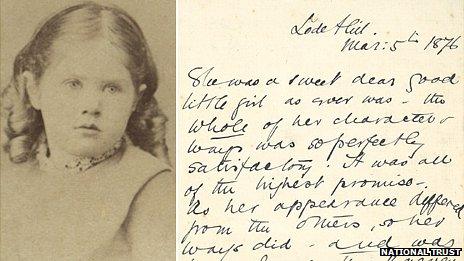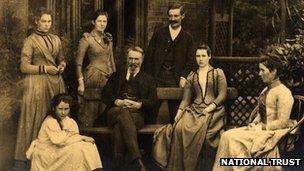Quarry Bank Mill letters show Victorians 'not stern and detached'
- Published

The letters include a description of Emily as a "dear, good little girl as ever was"
Letters by the relatives of a Victorian child who died suddenly show the people of the era were "not as stern as is often thought", an archivist has said.
Ellen Fenton from Quarry Bank Mill said the letters "detail poetically" the Greg family's love for six-year-old Emily, who died of scarlet fever.
"In their letters, there is a lot of emotion and, on certain occasions, a lot of humour," she said.
The letters about the death in 1876 are on display at the Cheshire mill.
The Greg family built and ran five mills in the Cheshire and Manchester area during the Industrial Revolution.
Ms Fenton said their letters detailed how the girl's father, Henry, had been "with his daughter when she died after being taken ill very suddenly".
"This perception of stern Victorian families was not necessarily the truth and in their letters, there is a lot of emotion and, on certain occasions, a lot of humour."
She said the letters proved Victorians - and in particular Victorian men - were "not as stern or detached from their families as is often thought".
'True insight'
The letters include a description of Emily by her father, in which he said she was a "dear, good little girl as ever was".
He went on to add that "the whole of her character was so perfectly satisfactory - it was all of the highest promise".

Henry Russell Greg was with his daughter Emily when she died
Another letter details how, on Emily's birthday, Henry planned a memorial day by paying for 100 children children from the nearby Stockport workhouse to have a picnic in the countryside.
Ms Fenton said the letters, which came in envelopes bordered with black to signify mourning, provided a "true insight into how Victorians dealt with love and loss".
"I think it is a shame that, in some ways, we sometimes don't express ourselves today as well as they did in their letters, she said.
"These letters make the family feel like very real people."